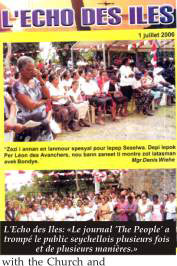

 The Catholic Church has accused the People (organ of the SPPF) of not being truthful to its readers about the SPPF government’s relationship with the nation’s largest religious community in the past. The accusation is contained in an editorial entitled La Mémoire d’un Peuple (the memory of a people) published in this month’s issue of l’Echo des Iles, the mouthpiece of the Church. More than 90% of Seychellois are Catholics.
The Catholic Church has accused the People (organ of the SPPF) of not being truthful to its readers about the SPPF government’s relationship with the nation’s largest religious community in the past. The accusation is contained in an editorial entitled La Mémoire d’un Peuple (the memory of a people) published in this month’s issue of l’Echo des Iles, the mouthpiece of the Church. More than 90% of Seychellois are Catholics.
In the editorial the Church accuses the SPPF of making false statements about their relationship dating as far back as 1966. It quotes the People of 14th June: “For the past 29 years the SPPF government has always worked in close collaboration with the church … The SPPF government has never found any need to fight with the Church and will never do so.” This, the Catholic Church says is a false declaration.
L’Echo des Iles gave a list actions taken during the one party state, examples of bad faith by SPPF vis-à-vis the Catholic Church. The editorial characterised the SPPF government as one that came to power as a result of a coup d’etat – in other words, in the eyes of the Church it was illegitimate.
One decision which Mr Rene took against the Catholic Church during the one party state the Church said, was to deny the Church permission to bring two polish priests to work in
In a long editorial in the state controlled newspaper Seychelles Nation on
It was, of course, the brave Poles who, in 1982, started the process that resulted in the disintegration of the once mighty communist empire of the Soviet Union in 1989 by agitating for freedom of association in the
Rene paid five official visits to Communist China and
The l’Echo des Iles editorial also reminded the SPPF that it refused the then Brother Imier permission to return to
In its editorial in this month’s issue, l’Echo des Iles also reminded the People that the SPPF government’s first action after it nationalised all the primary schools belonging to the church was to change the names of all the schools that had been named after saints such as St John Bosco, St Dominique Savio, Ste Therese and St Agnes.
The Catholic Church also reminded the SPPF that for 15 years its government refused parishioners permission to hold fancy fairs on the occasion of the celebration of the parish saint, with the lame excuse that they were pocketing the money generated by these events. And the list of SPPF sins against the Catholic Church is long the Church journal said and added with some cynicism, ‘this is what The People calls “always work in close collaboration with the Church”.
L’echo des Iles recounted the first occasion when the SPPF came into conflict with the Church. It arose in an edition of The People dated
Father Alain had written in 1966 that The People was misleading the workers by telling them falsehoods about the agreement between the union and the government on a labour dispute. The church journal had accused the People (by extension the SPUP) of intentionally misleading the workers and the public on the terms of the settlement of the dispute, prompting the editor to question whether the whole dispute wasn’t just politics after all. Father Alain then accused SPUP of resorting to attacking the person rather than the ideas he holds when they cannot defend their arguments. This is, interestingly, the same tactics being used today by SPPF MNA’s in the National Assembly.
“We respect the politics of SPUP. We are ready to collaborate with them or anyone to address the problems of the country. But it must be based on Truth and Respect” the Catholic Church declared 40 years ago.
The Catholic journal pointed out that on
L’Echo des Iles reproduced the message it published on the occasion of independence, wishing best wishes to the two leaders as well as the members of the coalition government, with the hope that they will be blessed with wisdom and intelligence to work for all the people for many years to come, in an independent Seychelles.
Sadly, the journal noted, the coalition lasted less than one year. And l’Echo des Iles ended its editorial with the following cynical remark “One of the parties discovered that the people had become independent , but they had not yet been liberated”. It is to be noted that Albert Rene owes his education and profession to the financial, moral and spiritual support of the Catholic Church which he has today rejected in favour of another faith.
The current editor of l’Echo des Iles is father Edwin Mathiot who celebrates 40 years of priesthood this week. He has been the Vicar General since 1986. As of this month, Father Mathiot has been a priest in our midst preaching the gospel, love, peace and reconciliation for as long as Albert Rene has been lying to the people of Seychelles, practicing demagoguery and inciting violence against his political adversaries.